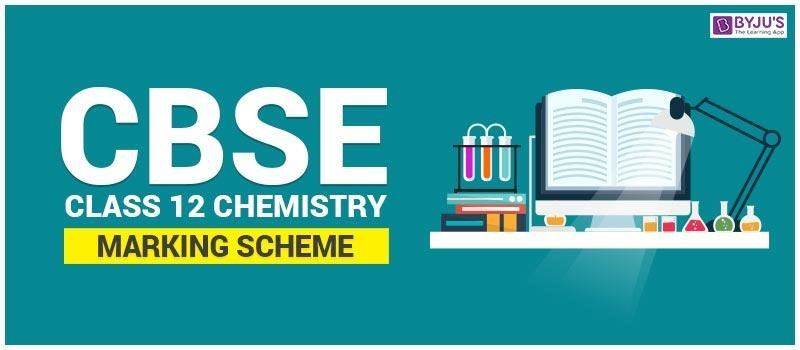
Class 12 Chemistry is one of the most scoring subjects in CBSE. Students should plan smartly and work more efficiently to score good marks in the subject. One way of working efficiently is to get accustomed to the CBSE Marking Scheme for Class 12 Chemistry and the important topics. The board has also revised the CBSE Class 12 syllabus and reduced it to 30% for the 2020-21 academic year. The decision has been taken due to the widespread Coronavirus pandemic. Based on the revised syllabus, the board has released the latest CBSE Class 12 Chemistry Sample Papers 2021 and marking scheme. Going through it, students will get a good idea of the exam pattern, question paper design and changes made in the question paper pattern. The marking scheme helps students to express the answers in steps so that they do not lose marks in the exam.
The CBSE Class 12 Chemistry Marking Scheme is designed by the Central Board of Secondary Education following certain guidelines. The question paper consists of objective, case-based, short answer and long answers questions. Students should know the CBSE Class 12 Chemistry marking scheme properly before appearing in the exam. The marking scheme helps students to get an idea about the question pattern, difficulty level, and mark weightage.
CBSE Class 12 Chemistry Marking Scheme: Question Paper Design
The board examination for the year 2020‐21, there will be two different parts of the Chemistry paper as mentioned below. The two‐part Assessment will carry a weightage of 50% for each section.
Part A: will be the objective type exams OMR/ Computer based test for the complete rationalized syllabus for 2020‐21. It will consist of MCQs as well as Assertion/ Reasoning type questions. MCQ and Assertion/ Reasoning type questions will include the format of case based/ source based/integrated questions.
Part B: will be a subjective/descriptive type test for the complete rationalized syllabus for 2020‐21, announced by the board and that will be held with the objective type test.
Part A: Objective Type Paper
| Type | Marks for Each Question | No. of Questions | Total Marks | Percentage |
| Objective | 1 | 19 | 19 | 54.29 |
| 2 | 5 | 10 | 28.57 | |
| Case Based | 3 | 2 | 6 | 17.14 |
| Total | 26 | 35 | 100 |
Part B: Descriptive Paper
| Type | Marks for Each Question | No. of Questions | Total Marks | Percentage |
| Short Answer I | 2 | 4 | 8 | 22.86 |
| Short Answer II | 3 | 4 | 12 | 34.28 |
| Long Answer | 5 | 3 | 15 | 42.86 |
| Total | 11 | 35 | 100 |
CBSE Class 12 Chemistry Question Paper Design
| Domains | Total Marks | % |
| Remembering and Understanding: Exhibit memory of previously learned material by recalling facts, terms, basic concepts and answers. Demonstrate understanding of facts and ideas by organizing, comparing, translating, interpreting, giving descriptions and stating main ideas. | 28 | 40 |
| Applying: Solve problems to new situations by applying acquired knowledge, facts, techniques and rules in a different way. | 21 | 30 |
| Analysing, Evaluating and Creating: Examine and break information into parts by identifying motives or causes. Make inferences and find evidence to support generalizations. Present and defend opinions by making judgments about information, validity of ideas or quality of work based on a set of criteria. Compile information together in a different way by combining elements in a new pattern or proposing alternative solutions. | 21 | 30 |
Unit-wise Weightage to Class 12 Chemistry Subject
Time: 3 Hours
Maximum Marks (Theory paper): 70 Marks
| Unit No. | Title | Marks |
| Unit 1 | Solutions | |
| Unit 2 | Electrochemistry | |
| Unit 3 | Chemical Kinetics | |
| Unit 4 | d -and f -Block Elements | |
| Unit 5 | Coordination Compounds | |
| Unit 6 | Haloalkanes and Haloarenes | 28 |
| Unit 7 | Alcohols, Phenols and Ethers | |
| Unit 8 | Aldehydes, Ketones and Carboxylic Acids | |
| Unit 9 | Amines | |
| Unit 10 | Biomolecules | |
| Total | 70 |
Marking Scheme of Class 12 Chemistry Practical
| Evaluation Scheme for Examination | Marks |
| Volumetric Analysis | 08 |
| Salt Analysis | 08 |
| Content-Based Experiment | 06 |
| Project Work | 04 |
| Class record and viva | 04 |
| Total | 30 |
Students can also learn the CBSE Class 12 Mathematics Marking Scheme, General Instructions, and design of question paper, students can check the links mentioned below.
Stay tuned with BYJU’S to get the latest news on the CBSE exam along with syllabus, date sheet, sample papers, previous year question papers, and more.

Comments